高中英语必修一unit2 课文
- 格式:doc
- 大小:43.00 KB
- 文档页数:6
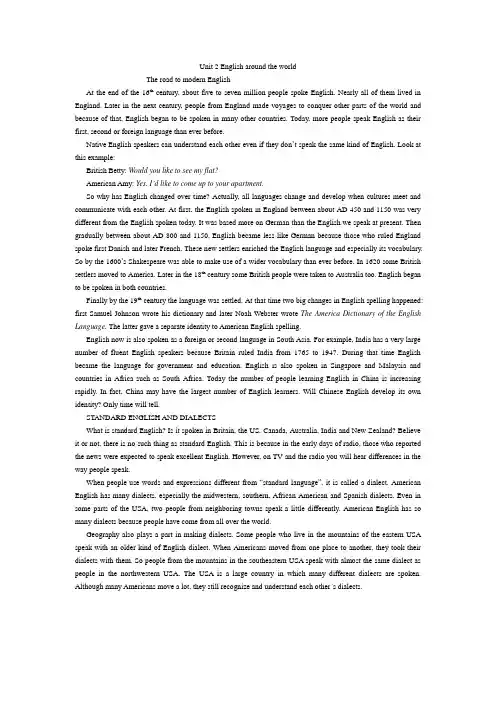
Unit 2 English around the worldThe road to modern EnglishAt the end of the 16th century, about five to seven million people spoke English. Nearly all of them lived in England. Later in the next century, people from England made voyages to conquer other parts of the world and because of that, English began to be spoken in many other countries. Today, more people speak English as their first, second or foreign language than ever before.Native English speakers can understand each other even if they don’t speak the same kind of English. Look at this example:British Betty: Would you like to see my flat?American Amy: Yes. I’d like to come up to your apartment.So why has English changed over time? Actually, all languages change and develop when cultures meet and communicate with each other. At first, the English spoken in England between about AD 450 and 1150 was very different from the English spoken today. It was based more on German than the English we speak at present. Then gradually between about AD 800 and 1150, English became less like German because those who ruled England spoke first Danish and later French. These new settlers enriched the English language and especially its vocabulary. So by the 1600’s Shakespeare was able to make use of a wider vocabulary than ever before. In 1620 some British settlers moved to America. Later in the 18th century some British people were taken to Australia too. English began to be spoken in both countries.Finally by the 19th century the language was settled. At that time two big changes in English spelling happened: first Samuel Johnson wrote his dictionary and later Noah Webster wrote The America Dictionary of the English Language. The latter gave a separate identity to American English spelling.English now is also spoken as a foreign or second language in South Asia. For example, India has a very large number of fluent English speakers because Britain ruled India from 1765 to 1947. During that time English became the language for government and education. English is also spoken in Singapore and Malaysia and countries in Africa such as South Africa. Today the number of people learning English in China is increasing rapidly. In fact, China may have the largest number of English learners. Will Chinese English develop its own identity? Only time will tell.STANDARD ENGLISH AND DIALECTSWhat is standard English? Is it spoken in Britain, the US, Canada, Australia, India and New Zealand? Believe it or not, there is no such thing as standard English. This is because in the early days of radio, those who reported the news were expected to speak excellent English. However, on TV and the radio you will hear differences in the way people speak.When people use words and expressions different from “standard language”, it is called a dialect. American English has many dialects, especially the midwestern, southern, African American and Spanish dialects. Even in some parts of the USA, two people from neighboring towns speak a little differently. American English has so many dialects because people have come from all over the world.Geography also plays a part in making dialects. Some people who live in the mountains of the eastern USA speak with an older kind of English dialect. When Americans moved from one place to another, they took their dialects with them. So people from the mountains in the southeastern USA speak with almost the same dialect as people in the northwestern USA. The USA is a large country in which many different dialects are spoken. Although many Americans move a lot, they still recognize and understand each other’s dialects.。
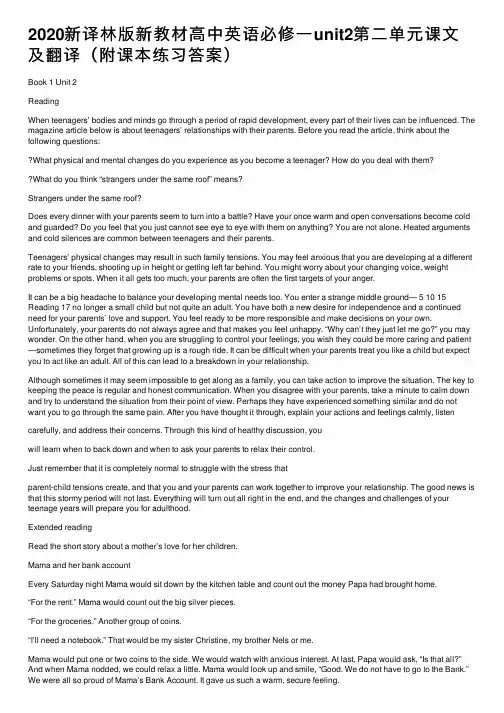
2020新译林版新教材⾼中英语必修⼀unit2第⼆单元课⽂及翻译(附课本练习答案)Book 1 Unit 2ReadingWhen teenagers’ bodies and minds go through a period of rapid development, every part of their lives can be influenced. The magazine article below is about teenagers’ relationships with their parents. Before you read the article, think about the following questions:What physical and mental changes do you experience as you become a teenager How do you deal with themWhat do you think “strangers under the same roof” meansStrangers under the same roof?Does every dinner with your parents seem to turn into a battle? Have your once warm and open conversations become cold and guarded? Do you feel that you just cannot see eye to eye with them on anything? You are not alone. Heated arguments and cold silences are common between teenagers and their parents.Teenagers’ physical changes may result in such family tensions. You may feel anxious that you are developing at a different rate to your friends, shooting up in height or getting left far behind. You might worry about your changing voice, weight problems or spots. When it all gets too much, your parents are often the first targets of your anger.It can be a big headache to balance your developing mental needs too. You enter a strange middle ground— 5 10 15 Reading 17 no longer a small child but not quite an adult. You have both a new desire for independence and a continued need for your parents’ love and support. You feel ready to be more responsible and make decisions on your own. Unfortunately, your parents do not always agree and that makes you feel unhappy. “Why can’t they just let me go?” you may wonder. On the other hand, when you are struggling to control your feelings, you wish they could be more caring and patient —sometimes they forget that growing up is a rough ride. It can be difficult when your parents treat you like a child but expect you to act like an adult. All of this can lead to a breakdown in your relationship.Although sometimes it may seem impossible to get along as a family, you can take action to improve the situation. The key to keeping the peace is regular and honest communication. When you disagree with your parents, take a minute to calm down and try to understand the situation from their point of view. Perhaps they have experienced something similar and do not want you to go through the same pain. After you have thought it through, explain your actions and feelings calmly, listencarefully, and address their concerns. Through this kind of healthy discussion, youwill learn when to back down and when to ask your parents to relax their control.Just remember that it is completely normal to struggle with the stress thatparent-child tensions create, and that you and your parents can work together to improve your relationship. The good news is that this stormy period will not last. Everything will turn out all right in the end, and the changes and challenges of your teenage years will prepare you for adulthood.Extended readingRead the short story about a mother’s love for her children.Mama and her bank accountEvery Saturday night Mama would sit down by the kitchen table and count out the money Papa had brought home.“For the rent.” Mama would count out the big silver pieces.“For the groceries.” Another group of coins.“I’ll need a notebook.” That would be my sister Christine, my brother Nels or me.Mama would put one or two coins to the side. We would watch with anxious interest. At last, Papa would ask, “Is that all?”And when Mama nodded, we could relax a little. Mama would look up and smile, “Good. We do not have to go to the Bank.”We were all so proud of Mama’s Bank Account. It gave us such a warm, secure feeling.When Nels graduated from grammar school, he wanted to go on to high school. “It will cost a little money,” he said.Eagerly we gathered around the table. I took down a box and laid it carefully in front of Mama. This was the “Little Bank”. It was used for sudden emergencies, such as the time when Christine broke her arm and had to be taken to a doctor.Nels listed the costs of the things he would need. Mama counted out the money in the Little Bank. There was not enough.“We do not want to go to the Bank,” she reminded. We all shook our heads.“I will work in Dillon’s grocery after school,” Nels volunteered.Mama gave him a bright smile and wrote down a number. “That’s not enough,” Papa said. Then he took his pipe out of his mouth and looked at it for a long time. “I will give up smoking,” he said suddenly.Mama reached across the table and touched Papa’s arm. Then she wrote down another figure.“I will look after the Elvington children every Friday night,” I said. “Christine can help me.”Now there was enough money. We all felt very good because we did not have to go downtown and draw money out of Mama’s Bank Account. So many things came out of the Little Bank that year: Christine’s dress for the school play, my little sister Dagmar’s operation ... Whatever happened, we always knew we still had the Bank to depend upon.That was twenty years ago.Last year I sold my first story. When the check came, I hurried over to Mama’s and put it in her lap. “For you,” I said, “to put in your Bank Account.”I noticed for the first time how old Mama and Papa looked. Papa seemed shorter, and Mama’s hair was silver now.“Tomorrow,” I told Mama, “you must take it to the Bank.”“You will go with me, Katrin?”“That won’t be necessary. Just hand it to the teller. He’ll pay it into your account.” Mama looked at me. “There is no account,”she said. “In all my life, I’ve never been inside a bank.”And when I didn’t—couldn’t—answer, Mama said seriously, “It is not good for little ones to be afraid—to not feel secure.”(Adapted from Kathryn Forbes’s Mama’s Bank Account, which has 17 short stories and describes the struggles and dreams of a family in San Francisco in the early 1900s)TranslationUnit 2Reading最熟悉的陌⽣⼈?每天的家庭晚餐幻化成激烈战⽃?热情开朗的谈话蜕变成冷淡警惕?⽆论什么事情都夏⾍语冰?其实⼤家都⼀样。

新外研版新教材高中英语选择性必修一全册课文及翻译(中英Word精编)Unit 1 Laugh out loud!Understanding ideasThe Best Medicine最佳妙药1 As I approach the hospital wearing my white coat, I look just like any other doctor. That is until I put on my curly rainbow wig, big red nose, and add my name badge “Doctor Larry Laugh-Out-Loud”. I walk through the doors into the waiting area, where there’s a familiar atmosphere of boredom and tension. People sit uncomfortably on plastic chairs, looking through old magazines, all of which have been read hundreds of times previously. Anxious parents do what they can to comfort nervous and crying children.当我穿着白大褂走进医院时,我看起来和其他医生没什么两样——直到我戴上卷曲的彩虹色假发和大红鼻子,别上我的名牌“拉里,笑哈哈医生”。
我穿过一道道门进入候诊区,这里充斥着常见的厌烦和紧张情绪。
人们别扭地坐在塑料椅上,翻阅着那些已经被读过数百遍的旧杂志。
焦虑的父母们正尽其所能安抚紧张哭闹的孩子。
2 In the middle of this particular scene I spot a small girl whose ankle is twice its normal size. I speak with the on-duty nurse, who tells me that Lara’s parents rushed her to the hospital after she fell off her bicycle. Since getting here, Lara has spent her time crying in pain. Although it’s the doctors and nurses who will treat her injury, it’s my job to make her feel better.在这个特别的场景里,我注意到一个小女孩,她的脚踝肿成了原来的两倍。
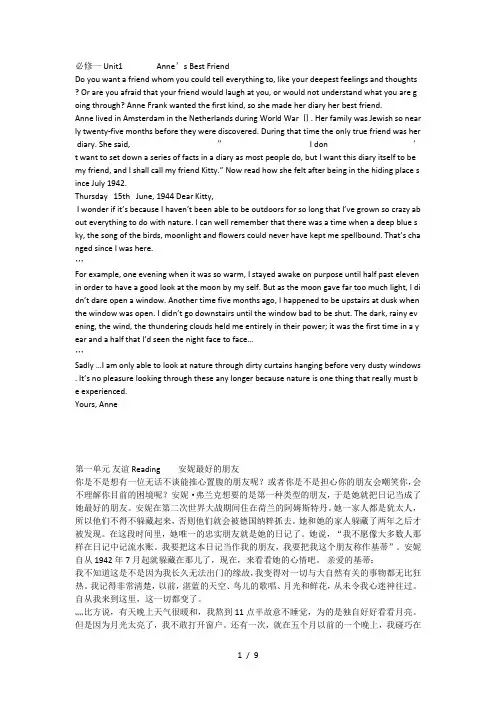
必修一 Unit1 Anne’s Best FriendDo you want a friend whom you could tell everything to, like your deepest feelings and thoughts ? Or are you afraid that your friend would laugh at you, or would not understand what you are g oing through? Anne Frank wanted the first kind, so she made her diary her best friend.Anne lived in Amsterdam in the Netherlands during World War Ⅱ. Her family was Jewish so near ly twenty-five months before they were discovered. During that time the only true friend was her diary. She said, ”I don’t want to set down a series of facts in a diary as most people do, but I want this diary itself to be my friend, and I shall call my friend Kitty.” Now read how she felt after being in the hiding place s ince July 1942.Thursday 15th June, 1944 Dear Kitty,I wonder if it’s because I haven’t been able to be outdoors for so long that I’ve grown so crazy ab out everything to do with nature. I can well remember that there was a time when a deep blue s ky, the song of the birds, moonlight and flowers could never have kept me spellbound. That’s cha nged since I was here.…For example, one evening when it was so warm, I stayed awake on purpose until half past eleven in order to have a good look at the moon by my self. But as the moon gave far too much light, I di dn’t dare open a window. Another time five months ago, I happened to be upstairs at dusk when the window was open. I didn’t go downstairs until the window bad to be shut. The dark, rainy ev ening, the wind, the thundering clouds held me entirely in their power; it was the first time in a y ear and a half that I’d seen the night face to face……Sadly …I am only able to look at nature through dirty curtains hanging before very dusty windows . It’s no pleasure looking through these any longer because nature is one thing that really must b e experienced.Yours, Anne第一单元友谊Reading 安妮最好的朋友你是不是想有一位无话不谈能推心置腹的朋友呢?或者你是不是担心你的朋友会嘲笑你,会不理解你目前的困境呢?安妮·弗兰克想要的是第一种类型的朋友,于是她就把日记当成了她最好的朋友。
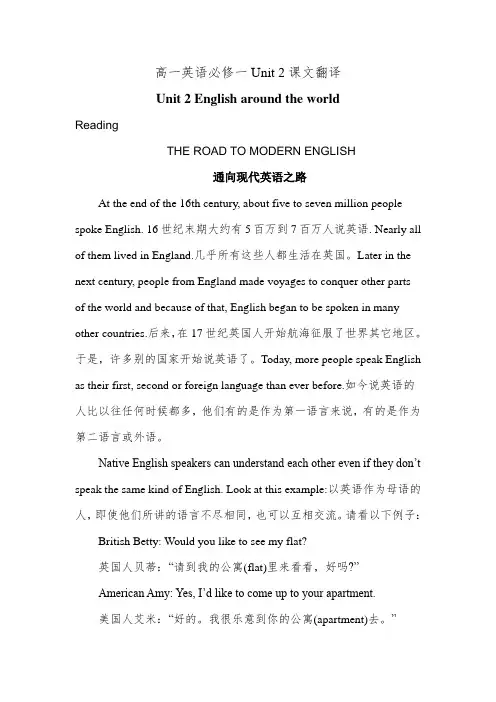
高一英语必修一Unit 2课文翻译Unit 2 English around the worldReadingTHE ROAD TO MODERN ENGLISH通向现代英语之路At the end of the 16th century, about five to seven million people spoke English. 16世纪末期大约有5百万到7百万人说英语. Nearly all of them lived in England.几乎所有这些人都生活在英国。
Later in the next century, people from England made voyages to conquer other partsof the world and because of that, English began to be spoken in many other countries.后来,在17世纪英国人开始航海征服了世界其它地区。
于是,许多别的国家开始说英语了。
Today, more people speak English as their first, second or foreign language than ever before.如今说英语的人比以往任何时候都多,他们有的是作为第一语言来说,有的是作为第二语言或外语。
Native English speakers can understand each other even if they don’t speak the same kind of English. Look at this example:以英语作为母语的人,即使他们所讲的语言不尽相同,也可以互相交流。
请看以下例子:British Betty: Would you like to see my flat?英国人贝蒂:“请到我的公寓(flat)里来看看,好吗?”American Amy: Yes, I’d like to come up to your apartment.美国人艾米:“好的。
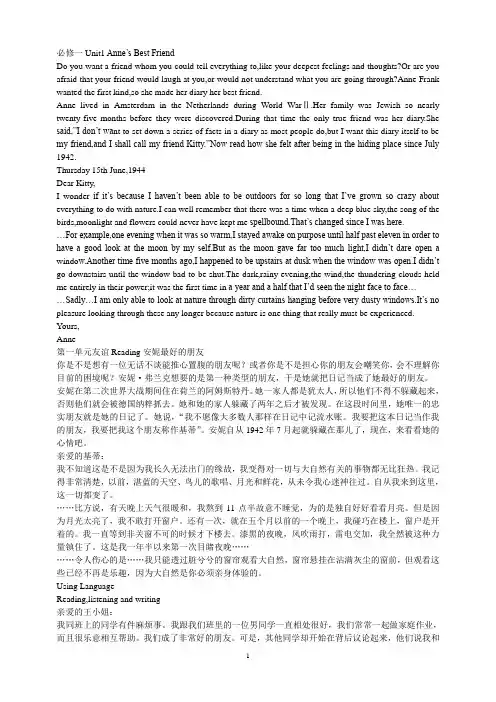
必修一Unit1 Anne’s Best FriendDo you want a friend whom you could tell everything to,like your deepest feelings and thoughts?Or are you afraid that your friend would laugh at you,or would not understand what you are going through?Anne Frank wanted the first kind,so she made her diary her best friend.Anne lived in Amsterdam in the Netherlands during World WarⅡ.Her family was Jewish so nearly twenty-five months before they were discovered.During that time the only true friend was her diary.She said,”I don’t wa nt to set down a series of facts in a diary as most people do,but I want this diary itself to be my friend,and I shall call my friend Kitty.”Now read how she felt after being in the hiding place since July 1942.Thursday 15th June,1944Dear Kitty,I wonder if it’s because I haven’t been able to be outdoors for so long that I’ve grown so crazy about everything to do with nature.I can well remember that there was a time when a deep blue sky,the song of the birds,moonlight and flowers could never have kept me spellbound.That’s changed since I was here.…For example,one evening when it was so warm,I stayed awake on purpose until half past eleven in order to have a good look at the moon by my self.But as the moon gave far too much light,I didn’t dare open a windo w.Another time five months ago,I happened to be upstairs at dusk when the window was open.I didn’t go downstairs until the window bad to be shut.The dark,rainy evening,the wind,the thundering clouds held me entirely in their power;it was the first time in a year and a half that I’d seen the night face to face……Sadly…I am only able to look at nature through dirty curtains hanging before very dusty windows.It’s no pleasure looking through these any longer because nature is one thing that really must be experienced. Yours,Anne第一单元友谊Reading安妮最好的朋友你是不是想有一位无话不谈能推心置腹的朋友呢?或者你是不是担心你的朋友会嘲笑你,会不理解你目前的困境呢?安妮·弗兰克想要的是第一种类型的朋友,于是她就把日记当成了她最好的朋友。
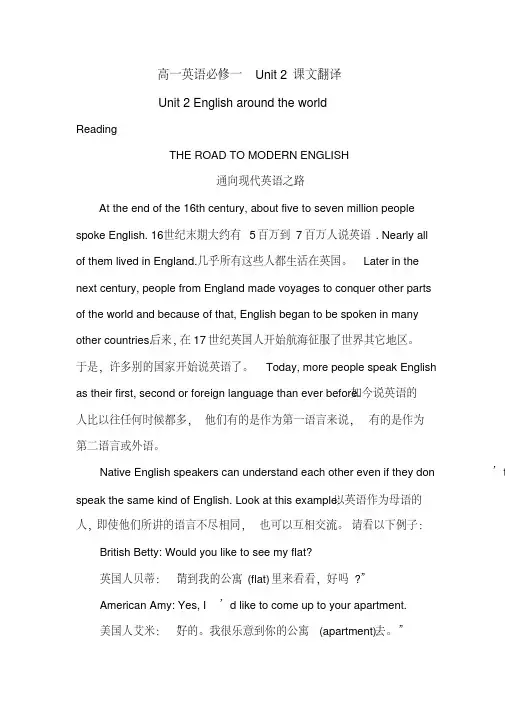
高一英语必修一Unit 2课文翻译Unit 2 English around the worldReadingTHE ROAD TO MODERN ENGLISH通向现代英语之路At the end of the 16th century, about five to seven million peoplespoke English. 16世纪末期大约有5百万到7百万人说英语. Nearly allof them lived in England.几乎所有这些人都生活在英国。
Later in thenext century, people from England made voyages to conquer other partsof the world and because of that, English began to be spoken in manyother countries.后来,在17世纪英国人开始航海征服了世界其它地区。
于是,许多别的国家开始说英语了。
Today, more people speak Englishas their first, second or foreign language than ever before.如今说英语的人比以往任何时候都多,他们有的是作为第一语言来说,有的是作为第二语言或外语。
Native English speakers can understand each other even if they don’t speak the same kind of English. Look at this example:以英语作为母语的人,即使他们所讲的语言不尽相同,也可以互相交流。
请看以下例子:British Betty: Would you like to see my flat?英国人贝蒂:“请到我的公寓(flat)里来看看,好吗?”American Amy: Yes, I’d like to come up to your apartment.美国人艾米:“好的。

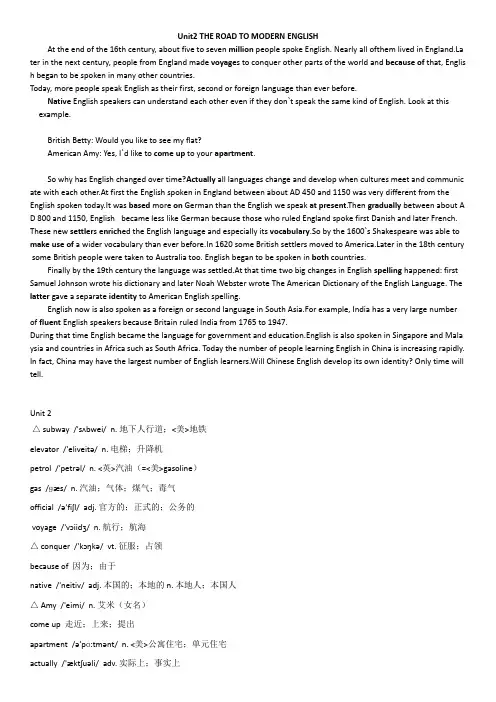
Unit2 THE ROAD TO MODERN ENGLISHAt the end of the 16th century, about five to seven million people spoke English. Nearly all ofthem lived in ter in the next century, people from England made voyage s to conquer other parts of the world and because of that, Englis h began to be spoken in many other countries.Today, more people speak English as their first, second or foreign language than ever before.Native English speakers can understand each other even if they don`t speak the same kind of English. Look at this example.British Betty: Would you like to see my flat?American Amy: Yes, I`d like to come up to your apartment.So why has English changed over time?Actually all languages change and develop when cultures meet and communic ate with each other.At first the English spoken in England between about AD 450 and 1150 was very different from the English spoken today.It was based more on German than the English we speak at present.Then gradually between about A D 800 and 1150, English became less like German because those who ruled England spoke first Danish and later French. These new settler s enrich ed the English language and especially its vocabulary.So by the 1600`s Shakespeare was able to make use of a wider vocabulary than ever before.In 1620 some British settlers moved to ter in the 18th century some British people were taken to Australia too. English began to be spoken in both countries.Finally by the 19th century the language was settled.At that time two big changes in English spelling happened: first Samuel Johnson wrote his dictionary and later Noah Webster wrote The American Dictionary of the English Language. The latter gave a separate identity to American English spelling.English now is also spoken as a foreign or second language in South Asia.For example, India has a very large number of fluent English speakers because Britain ruled India from 1765 to 1947.During that time English became the language for government and education.English is also spoken in Singapore and Mala ysia and countries in Africa such as South Africa. Today the number of people learning English in China is increasing rapidly. In fact, China may have the largest number of English learners.Will Chinese English develop its own identity? Only time will tell.Unit 2△ subway /'sʌbwei/ n. 地下人行道;<美>地铁elevator /'eliveitə/ n. 电梯;升降机petrol /'petrəl/ n. <英>汽油(=<美>gasoline)gas /ɡæs/ n. 汽油;气体;煤气;毒气official /ə'fiʃl/ adj. 官方的;正式的;公务的voyage /'vɔiidʒ/ n. 航行;航海△ conquer /'kɔŋkə/ vt. 征服;占领because of 因为;由于native /'neitiv/ adj. 本国的;本地的 n. 本地人;本国人△ Amy /'eimi/ n. 艾米(女名)come up 走近;上来;提出apartment /ə'pɑ:tmənt/ n. <美>公寓住宅;单元住宅actually /'æktʃuəli/ adv. 实际上;事实上AD 公元base /beis/ vt. 以…为根据 n. 基部;基地;基础at present 现在;目前gradual /'ɡrædʒuəl/ adj. 逐渐的;逐步的gradually /'grædʒuəli/ adv. 逐渐地;逐步地Danish /'deiniʃ/ n. 丹麦语;adj. 丹麦的;丹麦的人;丹麦语的enrich /in'ritʃ/ vt. 使富裕;充实;改善vocabulary /və'kæbjuləri/ n. 词汇;词汇量;词表△ Shakespeare /ʃeikspiə/ 莎士比亚(英国剧作家,诗人)make use of 利用;使用spelling /'speliŋ/ n. 拼写;拼法△ Samuel Johnson /'sæmjuəl 'dʒɔnsn/ 塞缪尔·约翰逊(英国作家,批评家)△ Noah Webster /'nəuə 'webstə/ 诺厄·韦伯斯特(美国词典编纂家)latter /'lætə/ adj. 较后的;后半的;(两者中)后者的identity /ai'dentəti/ n. 本身;本体;身份fluent /'flu:ənt/ adj. 流利的;流畅的fluently /'flu:əntlɪ/ adv. 流利地;流畅地Singapore /siŋə'pɔ:/ n. 新加坡(东南亚国家)Malaysia /mə'leiziə/ n. 马来西亚(东南亚国家);马来群岛such as 例如……;像这种的frequent /'fri:kwənt/ adj. 频繁的;常见的frequently /'fri:kwəntli/ adv. 常常;频繁地usage /'ju:sidʒ/ n. 使用;用法;词语惯用法command /kə'mɑ:nd/ n. & vt. 命令;指令;掌握request /ri'kwest/ n. & vt. 请求;要求△ dialect /'daiəlekt/ n. 方言expression /ik'spreʃn/ n. 词语;表示;表达midwestern /mid'westən/ adj. 中西部的;有中西部特性的African /'æfrikən/ adj.非洲的;非洲人的;非洲语言的Spanish /'spæniʃ/ adj.西班牙的;西班牙人的;西班牙语的 n.西班牙人;西班牙语play a part (in) 扮演一个角色;参与eastern /'i:stən/ adj. 东方的;东部的southeastern /sauθ'i:stən/ adj. 东南方的;来自东南的northwestern /nɔ:θ'westən/ adj. 西北方的;来自西北的recognize /'rekəɡnaiz/ vt. 辨认出;承认;公认lorry /'lɔri/ n. <英>卡车(=<美>truck)△ Lori /'lɔri/ n. 罗丽(女名)△ Houston /'hju:stən/ n.休斯敦(美国城市)△ Texas /'teksəs/ n.得克萨斯州(美国州名)accent /'æksənt/ n. 口音;腔调;重音△ Buford /'bju:fəd/ n.布福德(姓氏;男名)△ Lester /'lestə/ n.莱斯特(姓氏;男名)△ catfish /'kætfiʃ/ n. 鲶鱼 lightning /'laitniŋ/ n. 闪电straight /streit/ adv. 直接;挺直 adj. 直的;笔直的;正直的block /blɔk/ n. 街区;块;木块;石块cab /kæb/ n. 出租车Unit2 STANDARD ENGLISH AND DIALECTSWhat is standard English?Is it spoken in Britain, the US, Canada, Australia, India and New Zealand?Believe it or not, there is no such thing as standard English.Many people believe the English spoken on TV and the radio is s tandard English.This is because in the early days of radio, those who reported the news were expected to speak excellent English.However, on TV and the radio you will hear differences in the way people speak.When people use words and expressions different from “standard language”, it is called a dialect.American English has many dialects, especially the midwestern, southern, African American and Spanish dialects.Even in s ome parts of the USA, two people from neighbouring towns speak a little differently.American English has so many dialects because people have come from all over the world.Geography also plays a part in making dialects.Some people who live in the mountains of theeastern USA speak with an older kind of English dialect.When Americans moved from one place to another, they took their dialects with them.So people from the mountains in the southeastern USA speak with almost the same dialect as people in the northwestern USA.The USA is a large country in which many different dialects are spoken.Although many Americans move a lot, they still recognize and understand each other`s dialects.。
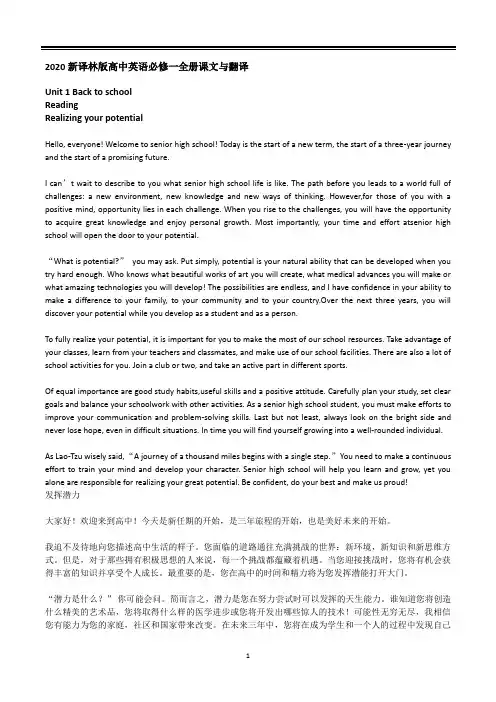
2020新译林版高中英语必修一全册课文与翻译Unit 1 Back to schoolReadingRealizing your potentialHello, everyone! Welcome to senior high school! Today is the start of a new term, the start of a three-year journey and the start of a promising future.I can’t wait to describe to you what senior high school life is like. The path before you leads to a world full of challenges: a new environment, new knowledge and new ways of thinking. However,for those of you with a positive mind, opportunity lies in each challenge. When you rise to the challenges, you will have the opportunity to acquire great knowledge and enjoy personal growth. Most importantly, your time and effort atsenior high school will open the door to your potential.“What is potential?”you may ask. Put simply, potential is your natural ability that can be developed when you try hard enough. Who knows what beautiful works of art you will create, what medical advances you will make or what amazing technologies you will develop! The possibilities are endless, and I have confidence in your ability to make a difference to your family, to your community and to your country.Over the next three years, you will discover your potential while you develop as a student and as a person.To fully realize your potential, it is important for you to make the most of our school resources. Take advantage of your classes, learn from your teachers and classmates, and make use of our school facilities. There are also a lot of school activities for you. Join a club or two, and take an active part in different sports.Of equal importance are good study habits,useful skills and a positive attitude. Carefully plan your study, set clear goals and balance your schoolwork with other activities. As a senior high school student, you must make efforts to improve your communication and problem-solving skills. Last but not least, always look on the bright side and never lose hope, even in difficult situations. In time you will find yourself growing into a well-rounded individual.As Lao-Tzu wisely said, “A journey of a thousand miles begins with a single step.”You need to make a continuous effort to train your mind and develop your character. Senior high school will help you learn and grow, yet you alone are responsible for realizing your great potential. Be confident, do your best and make us proud!发挥潜力大家好!欢迎来到高中!今天是新任期的开始,是三年旅程的开始,也是美好未来的开始。
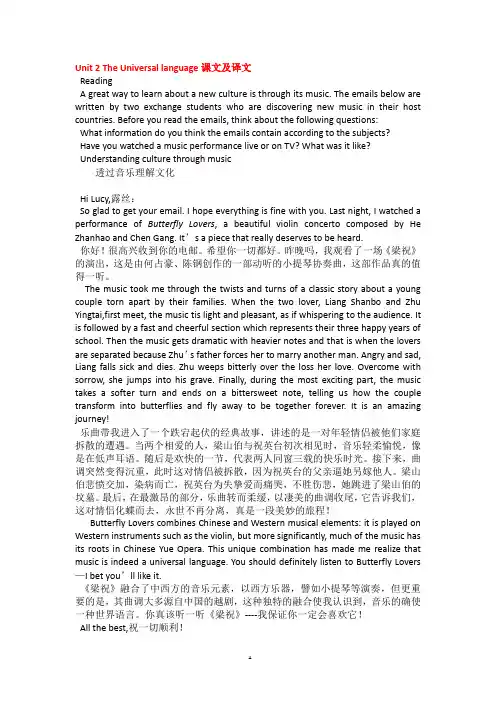
Unit 2 The Universal language课文及译文ReadingA great way to learn about a new culture is through its music. The emails below are written by two exchange students who are discovering new music in their host countries. Before you read the emails, think about the following questions:What information do you think the emails contain according to the subjects?Have you watched a music performance live or on TV? What was it like? Understanding culture through music透过音乐理解文化Hi Lucy,露丝:So glad to get your email. I hope everything is fine with you. Last night, I watched a performance of Butterfly Lovers, a beautiful violin concerto composed by He Zhanhao and Chen Gang. It’s a piece that really deserves to be heard.你好!很高兴收到你的电邮。
希望你一切都好。
昨晚吗,我观看了一场《梁祝》的演出,这是由何占豪、陈钢创作的一部动听的小提琴协奏曲,这部作品真的值得一听。
The music took me through the twists and turns of a classic story about a young couple torn apart by their families. When the two lover, Liang Shanbo and Zhu Yingtai,first meet, the music tis light and pleasant, as if whispering to the audience. It is followed by a fast and cheerful section which represents their three happy years of school. Then the music gets dramatic with heavier notes and that is when the lovers are separated because Zhu’s father forces her to marry another man. Angry and sad, Liang falls sick and dies. Zhu weeps bitterly over the loss her love. Overcome with sorrow, she jumps into his grave. Finally, during the most exciting part, the music takes a softer turn and ends on a bittersweet note, telling us how the couple transform into butterflies and fly away to be together forever. It is an amazing journey!乐曲带我进入了一个跌宕起伏的经典故事,讲述的是一对年轻情侣被他们家庭拆散的遭遇。
新外研社高中英语必修一Reading原文Unit 1 A new start(新的开始)Understanding ideasMy First Day at Senior High我在高中的第一天After I had pictured it over and over again in my mind, the big day finally arrived: my first day at senior high!我在脑海里一遍又一遍地想象它之后,那个重要的日子终于到来了:我上高中的第一天!●I woke up early and rushed out of the door in my eagerness to get to know my new school.我早早地就醒了,迫不及待地跑出门去了解我的新学校。
The campus was still quiet when I arrived, so I decided to explore a bit.当我到达的时候,校园还很安静,所以我决定去探索一下。
●I was looking at the photos on the noticeboard when I heard a voice behind me.当我正在看布告栏上的照片,这时听到身后有个声音。
“New here?”“新来的?”Turning around, I saw a white-haired man.我转过身来,看见一位白发老人。
“Yes,” I replied.“是的。
”我回答。
“I'm wondering what life is going to be like here.”“我想知道这儿的生活将会是什么样子的。
”“Don't worry,” he gave me a smile.“别担心。
”他给了我一个微笑。
“You'll soon find out.”“你很快就会明白的。
必修一Unit 1 Lesson 1 完美一日?家里蹲——来自Birmingham的四十三岁的Brian Blakey 正坐在他的沙发上告诉我他完美的一天是如何的。
我醒来的时候我并不是立刻起床。
我会先打开电视收看儿童节目和老电影直到十点半。
然后我起来了,走下楼,打开厅里的另一台电视。
中午的时候,我就吃点饼干和一杯牛奶,同时收看着新闻。
到了下午,我一般会看另一部老电影——在那时他们总会播点好电影。
傍晚,我经常是收看体育系列节目并再次看看新闻。
我喜欢六点的重点新闻。
到了九点半,如果BBC 2有在放好的戏剧,我就会转台过去看看。
深夜,我会看更多的电影然后通常在凌晨两点关电视。
我从不会整晚都看着电视。
一天里我一般会用十六到十七个小时看电视。
每一天里我也会做些运动。
我会带着我的狗狗Tina,在每个下午都走一走。
当然是不会很远的,就在我家的外墙那边。
在狗狗绕圈圈走的时候我就总是坐在石头上看着我的掌上电视。
当然了,如果没有一个优秀的妻子的话我也无法用这种方式生活。
因为她在上班所以现在不在这里,但她总是会先准备好我的饭菜。
我们没有太多的钱,你明白的,但我们很幸福。
坐下然后收看电视。
这里就是遥控器。
世界就在你你们脚下,在你们手里。
工作狂——三十六岁的Bob Black正在他的文案前伏案工作。
我通常都是在我的闹钟响前五分钟醒来的。
当闹钟一响,我就会立刻从床上跳起。
我用少于十五分钟的时间洗漱换衣、吃早餐、出门并搭上巴士。
我总是第一个到办公室的人。
早上总是很忙而下午甚至更忙。
会议和电话占据一天里的绝大部分。
每一分钟都充斥着紧急时间。
到晚上八点左右,我通常会找点时间来处理我的文案并回复一些个人邮件。
我回到家的时候就已经是深夜十点了,我还会看一些从办公室带回来的文件,这样就可以为第二天的工作做准备。
我睡觉的时候是午夜,这是我的妻儿一般都已经睡着。
我很少有时间陪伴我的妻儿,他们也会跟我抱怨。
但我尽力去工作才能尽量的赚钱给他们。
新人教版高中英语必修一课文原文及翻译(Word精校版)Welcome Unit 欢迎单元Reading and ThinkingFIRST IMPRESSION 第一印象Han Jing's World7:00a.m.So this is it-senior high school at last. I'm not outgoing so I’m a little anxious right now. I want to make a good first impression. Will I make any friends? What if no one talks to me?晚上10:45韩静的世界早上7:00这就是了一一终于到了高中学校!我性格并不外向,所以现在感觉有点焦虑。
我想给别人留下良好的第一印象。
我会交到朋友吗?要是没人跟我说话怎么办呢?12:30p.mI just had my first maths class at senior high school! The class was difficult, but the teacher was kind and friendly. He even told us a funny story and everyone laughed so much! I found most of my classmates and teachers friendly and helpful.中午12:30我刚刚上完高中的第一节数学课!这课(内容)很难,但老师却很友善。
他还给我们讲了笑话,惹得每个人都哈哈大笑!我觉得我的大多数同学和老师都很友好,而且乐于助人。
5:32p.mThis afternoon, we had our chemistry class in the science lab. The lab is new and the lesson was great, but the guy next to me tried to talk to me the whole time. I couldn’t concentrate on the experiment. I really wanted to tell him to please be quiet and leave me alone.下午5:32今天下午,我们在科学实验室上化学课。
高中英语必修一课文原文及翻译Unit 1 Teenage lifeReading and ThinkingTHE FRESHMAN CHALLENGE新生的挑战Hi! My name is Adam and I’m a freshman at senior high school. Going from junior high school to senior high school is a really big challenge. The first week was a little confusing.嗨!我叫亚当,是高中一年级的新生。
从初中过渡到高中真是一项巨大的挑战。
第一周有点让人迷茫。
First, I had to think very carefully about which courses I wanted to take. The school adviser helped me choose the suitable ones: maths, English, chemistry, world history, and Chinese. I know that Chinese is a very difficult language, but I hope to be fluent when I graduate. My adviser recommended that I should sign up for advanced literature because I like English and I’m good at it.首先,我必须非常认真地考虑我想选哪些课程。
学校的指导老师帮我选择了适合我的课程:数学、英语、化学、世界史和中文。
我知道中文是一门非常难学的语言,但我希望毕业时能说得很流利。
因为我喜欢英语而且成绩不错,我的指导老师建议我选修高级文学。
I had to choose extra-curricular activities, too. I tried to join the school football team, but the coach told me that I didn’t play well enough. Obviously, I was unhappy, but I won’t quit. I’ll find a way to improve on my own so that I can make the team next year.I joined a volunteer club instead. Every Wednesday, we work at a soup kitchen and hand out food to homeless people in the community. 我还得选一些课外活动。
高一英语必修一第二单元课文Unit 2 English around the world is a fascinating topic that explores the diversity and richness of the English language. English is not just a tool for communication, but a reflection of culture and history.One of the most interesting aspects of English around the world is the different accents and dialects that have developed in various regions. From the crisp Received Pronunciation of British English to the melodic lilt of Caribbean English, each accent tells a story of its own. Accents can be influenced by historical factors, migration patterns, and even socio-economic status. For example, the English spoken in Australia has been shaped by the country's history as a former British colony, while the English spoken in India has been influenced by centuries of interaction with different cultures.Another fascinating aspect of English around the world is the presence of loanwords from other languages. English has borrowed words from languages such as French, Spanish, and Arabic, enriching its vocabulary and reflecting the global nature of communication. For example, the English language has borrowed culinary terms like "croissant" from French, scientific terms like "algebra" from Arabic, and cultural terms like "fiesta" from Spanish. These loanwords not only add depth to the English language but also highlight the interconnectedness of different cultures.Moreover, the rise of English as a global lingua franca has led to the development of new varieties of English known as World Englishes.These varieties reflect the unique blend of English with local languages and cultural influences. For instance, Singlish in Singapore combines English with words and expressions from Chinese, Malay, and Tamil. Similarly, Nigerian Pidgin English blends English with indigenous languages to create a vibrant and expressive form of communication. These World Englishes challenge the traditional notion of a standard English and celebrate linguistic diversity.In addition to accents, loanwords, and World Englishes, the spread of English has also had a significant impact on education and employment opportunities. English proficiency is often seen as a gateway to higher education, better job prospects, and greater social mobility. As a result, many non-native English speakers invest time and resources in learning the language, leading to a growing number of bilingual and multilingual individuals around the world.Overall, the study of English around the world is a testament to the power of language to bridge cultural divides and connect people from different backgrounds. As English continues to evolve and adapt to changing contexts, it remains a dynamic and vibrant language that reflects the diversity of the global community. By appreciating the richness of English in all its forms, we can gain a deeper understanding of the world we live in and the people we share it with.。
The Road to Modern English
At the end of the 16th century, about five to seven million people spoke English.
(End : in the end =finally ,at last最后)
(by the end of 到。
为止(常与完成时连用)
16世纪末期大约有5百万到7百万人说英语。
Nearly all of them lived in England. 几乎所有这些人都生活在英格兰。
Later in the next century, people from England made voyages to conquer other parts of the world and because of that, English began to be spoken in many other countries.
后来,在17世纪英国人开始航海征服了世界其它地区,于是,许多别的国家开始说英语了。
Today,more people speak English as their first ,second or a foreign language than ever before .如今说英语的人比以往任
何时候都多,他们有的是作为第一语言来说,有的是作为第二语言或外语。
Native English speakers can understand each other even if they don’t speak the same kind of English.
以英语作为母语的人,即使他们所讲的语言不尽相同,也可以互相交流。
Look at this example:请看以下例子:
British Betty: Would you like to see my flat ?
American Amy: Yes, I’d like to come up to your apartment.
英国人贝蒂:“请到我的公寓(flat)里来看看,好吗?
美国人艾米:“好的。
我很乐意到你的公寓(apartment)去。
”
So why has English changed over time?
(over time =as time goes by 随时间推移)
那么,英语在一段时间里为什么会起变化呢?
Actually all languages change and develop when cultures meet and communicate with each other. 事实上,当不同的文化互相交流渗透时,所有的语言都会有所发展、有所变化。
At first the English spoken in England between about AD 450 and 1150 was different from the English spoken today.
首先,在公元450年到1150年间,人们所说的英语跟今天所说的英语就很不一样。
It was based more on German than the English we speak at present.
当时的英语更多地是以德语为基础的,而现代英语不是。
Then gradually between about AD 800 and 1150, English became less like German because those who ruled England spoke first Danish and later French.
然后,渐渐地,大约在公元800年到1150期间,英语不那么像德语了,因为那时的英国的统治者起初讲丹麦语后来讲法语。
These new settlers enriched the English language and especially its vocabulary.
这些新的定居者大大丰富了英语语言,特别是在词汇方面。
So by the 1600’s Shakespeare was able to make use of a wider vocabulary than ever before. 所以到17世纪,莎士比亚所用的词汇量比以前任何时期都大。
In 1620 some British settlers moved to America.
在1620年,一些英国人搬迁到美洲定居。
Later in the 18th century some British people were taken to Australia, too.
后来,到了18世纪,有些英国人也被送往澳大利亚。
English began to be spoken in both countries.
两个国家的人都开始说英语了。
Finally by the 19th century the language was settled.
最后,到19世纪,英语才真正定形。
At that time two big changes in English spelling happened: first Samuel Johnson wrote his dictionary and later Noah Webster wrote The American Dictionary of the English Language.
那时,英语在拼写上发生了两大变化:首先塞缪尔.约翰逊编写了词典,后来,诺厄.韦伯斯特编纂了《美国英语词典》。
The latter gave a separate identity to American English spelling.后者体现了美国英语拼写的不同特色。
English now is also spoken as a foreign or second language in South Asia.
现在,英语在南亚也被当作外语或第二语言。
For example, India has a very large number of English speakers because Britain ruled India from 1765 to 1947.
比如说,印度拥有众多讲英语很流利的人,这是因为英国于1765年到1947年统治过印度。
During that time English became the language for government and education.
在那期间,英语成了官方语言和教育用语。
English is also spoken in Singapore and Malaysia and countries in Africa such as South Africa. 在新加坡、马来西亚和非洲其它国家,比如南非,人们也说英语。
Today the number of people learning English in China is increasing rapidly.
目前在中国学习英语的人数正在迅速增长。
a number of …的数量+名词复数,后谓语动词用单数
the number of许多,大量+名词复数,后谓语动词用复数In fact, China may have the largest number of English learners.
事实上,中国可能拥有世界上最多的英语学习者。
Will Chinese English develop its own identity?
中国英语会发展出自己的特色吗?
Only time will tell.这个问题只有时间会回答。